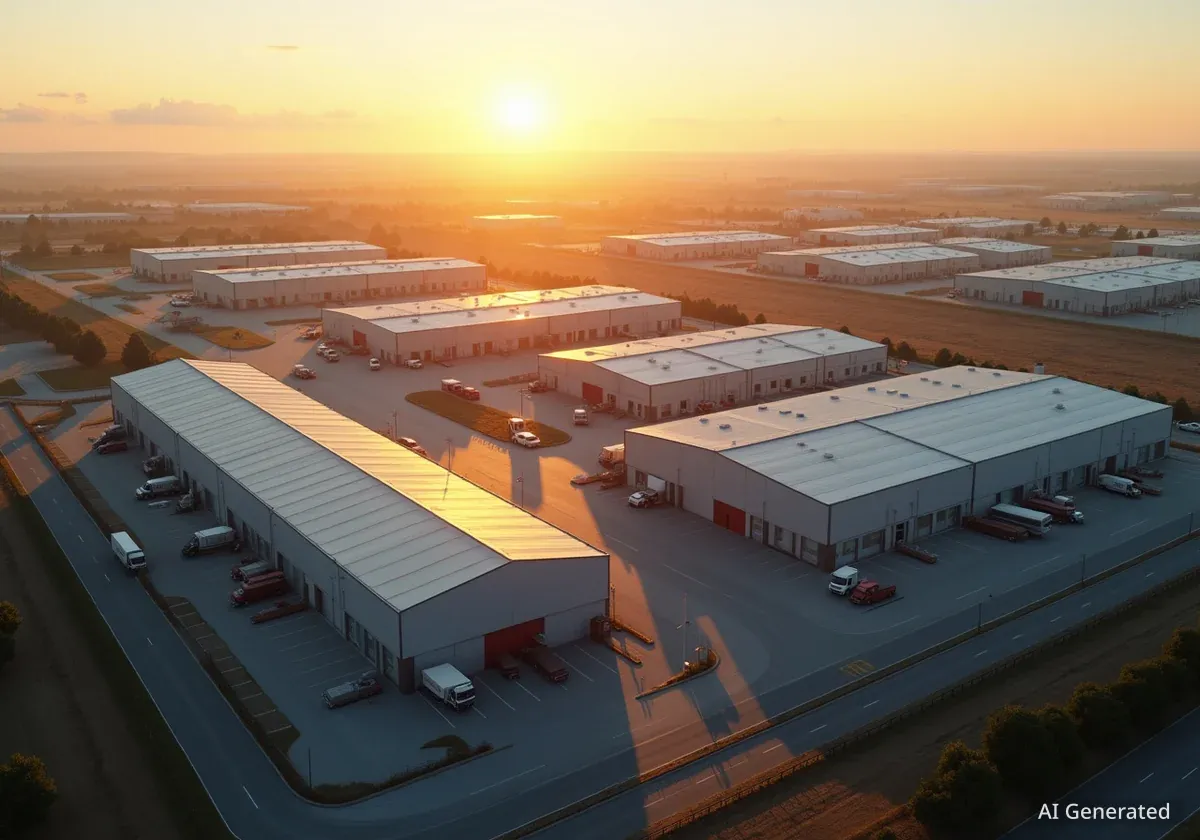In a major real estate transaction, investment firm Blackstone finalized its acquisition of PS Business Parks for approximately $7.6 billion. The deal significantly expanded Blackstone's industrial and business park portfolio, adding millions of square feet of commercial property in key markets across the United States.
The acquisition, which was completed in 2022, involved Blackstone taking ownership of PS Business Parks' entire portfolio, a move that bolstered the holdings of its industrial real estate platform, Link Logistics. This transaction underscores the high demand for logistics and industrial spaces, a trend accelerated by the growth of e-commerce.
Key Takeaways
- Blackstone acquired PS Business Parks in an all-cash deal valued at $7.6 billion.
- The transaction added approximately 27 million square feet of industrial and business park properties to Blackstone's portfolio.
- The acquired assets are managed by Link Logistics, Blackstone's industrial real estate subsidiary.
- This deal highlights the strategic importance of industrial real estate, particularly for last-mile logistics centers.
Details of the Landmark Acquisition
The agreement involved Blackstone acquiring all outstanding shares of PS Business Parks for $187.50 per share in an all-cash transaction. This price represented a significant premium for shareholders at the time and brought the total value of the deal to $7.6 billion, including debt.
The acquisition was managed through affiliates of Blackstone Real Estate, the firm's real estate investment arm. Upon completion, the extensive portfolio of PS Business Parks was integrated into Link Logistics, which is Blackstone's primary platform for managing U.S. industrial properties.
Portfolio at a Glance
- Total Space: Approximately 27 million square feet
- Property Types: Industrial parks, flex office space, and business parks
- Key Markets: California, Texas, South Florida, and Northern Virginia
- Tenant Base: Diverse, ranging from small businesses to larger corporations
According to reports from the time of the deal, the portfolio included around 96 properties, primarily located in high-demand, supply-constrained markets. These locations are critical for companies needing to store and distribute goods quickly to urban populations.
Strategic Importance for Link Logistics
For Blackstone's Link Logistics, the acquisition was a strategic move to strengthen its position as a leader in the U.S. industrial real estate market. The addition of 27 million square feet of high-quality assets expanded its national footprint and enhanced its ability to serve a growing tenant base.
David Levine, a senior managing director at Blackstone Real Estate, commented on the strategic fit of the acquired portfolio. He emphasized the quality of PS Business Parks' properties and their location in desirable infill markets, which are essential for efficient supply chains.
"We are excited to add PS Business Parks’ high-quality industrial portfolio to Link Logistics. This transaction is a testament to our long-standing conviction in the logistics sector and the importance of last-mile real estate for the digital economy."
The term "infill locations" refers to properties situated within established urban areas, closer to the end consumer. These sites have become increasingly valuable due to the rise of same-day and next-day delivery services, which require warehouses and distribution centers near population centers.
The Broader Market Context
The Blackstone-PS Business Parks deal occurred during a period of unprecedented demand for industrial real estate. The COVID-19 pandemic accelerated the shift from traditional retail to e-commerce, creating a surge in the need for warehouses, distribution centers, and logistics facilities.
What is Last-Mile Logistics?
Last-mile logistics is the final step in the delivery process, moving goods from a transportation hub to the final destination, typically a customer's home or a retail store. The efficiency of this stage is crucial for customer satisfaction and is a major driver of demand for well-located industrial properties.
This trend has made industrial real estate one of the most sought-after asset classes for institutional investors like Blackstone. The sector has demonstrated resilience and strong growth, attracting significant capital from investors looking for stable, long-term returns.
The Role of Public Storage
Prior to the acquisition, PS Business Parks operated as a publicly traded real estate investment trust (REIT). It was originally founded by Public Storage, a well-known self-storage company. While it operated independently, its historical ties to Public Storage were a notable part of its corporate identity.
The sale to Blackstone marked the end of PS Business Parks' journey as a public company, transitioning it into a privately held component of Blackstone's vast real estate empire. This move allowed Blackstone to capitalize on the portfolio's potential without the constraints of public market reporting.
Implications of the Transaction
The acquisition of PS Business Parks by Blackstone had several significant implications for the commercial real estate market. It demonstrated the immense scale of capital being deployed into the industrial sector and highlighted the consolidation trend, where large players acquire smaller portfolios to gain market share.
Furthermore, the deal underscored the value placed on properties that support the modern economy's supply chain infrastructure. With the integration into Link Logistics, the former PS Business Parks assets are now part of one of the largest industrial real estate platforms in the country, benefiting from scale, technology, and operational expertise.
For the tenants in these business parks, the change in ownership meant being part of a larger, more sophisticated network. Link Logistics focuses heavily on providing modern facilities and services to meet the evolving needs of logistics and e-commerce companies, which could lead to property upgrades and improved management over time.
Ultimately, the $7.6 billion transaction was a defining moment in the industrial real estate market, reflecting both the sector's robust health and the strategic vision of major investment firms like Blackstone in shaping the future of commerce and logistics in the United States.





